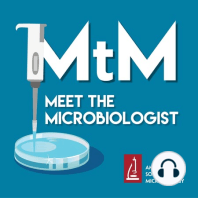24 min listen

Microbial Culture Collections and the Soil Microbiome with Mallory Choudoir
Microbial Culture Collections and the Soil Microbiome with Mallory Choudoir
ratings:
Length:
44 minutes
Released:
Apr 18, 2022
Format:
Podcast episode
Description
Dr. Mallory Choudoir, microbial ecologist and evolutionary biologist at the University of Massachusetts Amherst shares how she leverages microbial culture collections to infer ecological and evolutionary responses to warming soil temperatures. She discusses complexities of the soil microbiome and microbial dispersal dynamics, and introduces fundamental concepts about the intersection between microbes and social equity. Ashley’s Biggest Takeaways: Microbial culture collections are fundamental resources, serving as libraries where diverse species of microbes are identified, characterized and preserved in pure, viable form. Culture collections ensure conservation of species diversity and sustainable use of the collected microbes. For soil microbiologists, like Mallory Choudoir, culture collections provide the opportunity to connect patterns of genomic variation and microbial physiology to the conditions under which a particular microbe was isolated. Soil is a complex environment from the perspective of a microbe. In order to coexist in such a biologically diverse environment, which consists of spatial heterogeneity, as well as heterogeneity in access to moisture and nutrients, microbes must evolve different strategies to survive as part of a stable community. Choudoir’s field site is based in the Harvard Forest Long Term Ecological Research Program's field site, where coils are buried and have been heating the forest soil to 5 degrees above ambient temperatures for nearly 30 years. The study allows Choudoir and colleagues to observe and evaluate long-term responses to chronic soil warming stress. This research is important because microbes function as resources to the health and well-being of ourselves and our planet. Understanding how microbes adapt to biotic and abiotic stresses can help inform future conservation strategies, biotechnological approaches and applications and equitable allocation of microbial resources. Visit https://asm.org/mtm for links mentioned
Released:
Apr 18, 2022
Format:
Podcast episode
Titles in the series (100)
MTS6 Bruce Rittmann - Microbes, Waste and Renewable Energy by Meet the Microbiologist